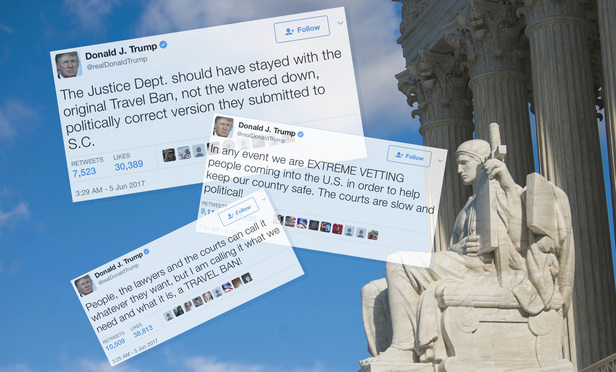 Credit: ALM photo illustration
Credit: ALM photo illustration
An extraordinary stream of tweets Monday morning by President Donald Trump attacked his own Justice Department’s revised travel ban as “watered down, politically correct,” and pushed for expedited handling of the ban by the U.S. Supreme Court.
“The courts are slow and political!” Trump wrote before 7 a.m. Eastern Time, also stating that “In any event we are EXTREME VETTING people coming into the U.S. in order to help keep our country safe.” That statement could telegraph that the ban is no longer necessary.
Critics of the ban responded that Trump is undermining his own defense of the executive order, which is now before the U.S. Supreme Court in a cert petition filed June 1. The U.S. Court of Appeals for the Fourth Circuit was the first appeals court to rule against the revised ban, and leaned heavily on Trumps’ previous comments.
Former acting Solicitor General Neal Katyal, who represents Hawaii in a similar challenge in the Ninth Circuit, tweeted, “Its kinda odd to have the defendant in Hawaii v. Trump acting as our co-counsel. We don’t need the help but will take it!” Katyal declined to elaborate.
“Government counsel must feel like they have a daily Perry Mason moment with their client jumping up in court screaming incriminating things,” George Washington University Law School professor Jonathan Turley wrote on Monday.
In addition to deciding whether to grant review in the case, the high court may now face a new dilemma: are Trump tweets fair game for citation in Supreme Court rulings as a modern-day form of “excited utterance?”
Twitter itself — but not a tweet — has only been cited once in a Supreme Court case. In Deitz v. Boudin, a 2016 case on recalling jurors, Justice Sonia Sotomayor wrote for the majority, “Immediately after discharge, a juror could text something about the case to a spouse, research an aspect of the evidence on Google, or read reactions to a verdict on Twitter.”
In a February oral argument, Justice Elena Kagan took note of Trump’s Twitter activity. “We’re sort of aware of it because the President now uses Twitter. But in fact, everybody uses Twitter. All 50 governors, all 100 senators, every member of the House has a Twitter account. So this has become a crucial — crucially important channel of political communication.” The issue in Packingham v. North Carolina was whether sex offenders could be blocked from using social media.
One of Trump’s Monday tweets undermines the insistence by some White House officials that the so-called travel ban is not a ban at all, but just a 90-day pause that allows for more detailed screening methods to created. “People, the lawyers and the courts can call it whatever they want, but I am calling it what we need and what it is, a TRAVEL BAN!” Trump wrote.
Turley wrote, “His reference to a ban (which the order is not) undermines the thrust of the arguments raised in courts across the country.”
Trump also urged his Justice Department to do something that would be procedurally impossible, namely urging that the Supreme Court consider a “much tougher version” of the ban than the one that is now before the court. “The Justice Dept. should ask for an expedited hearing of the watered down Travel Ban before the Supreme Court – & seek much tougher version!” That could not occur without a new policy being promulgated by the Trump administration that would then be challenged in a new piece of litigation that would make its way to the Supreme Court in due course.




